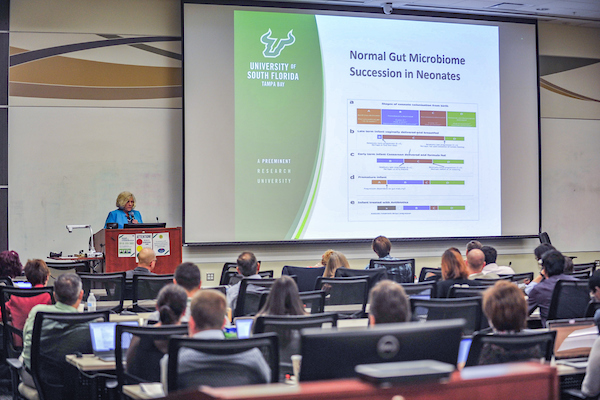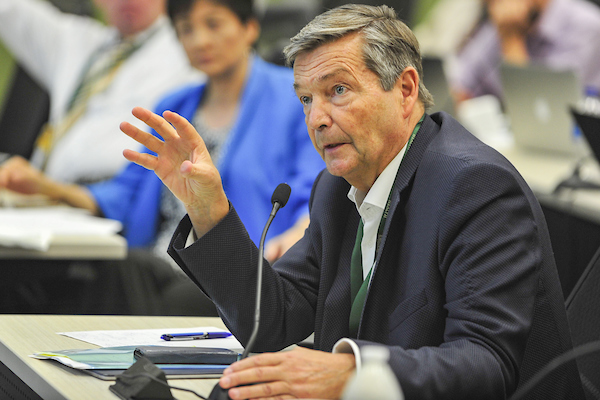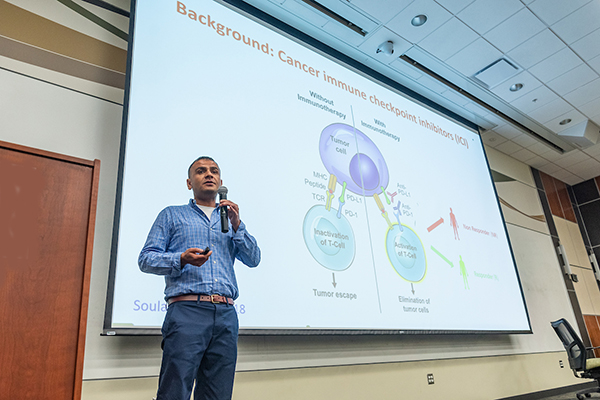The University of South Florida and the University of Florida convened a Microbiome Joint Workshop at USF Health on May 28, with research presentations by basic scientists and clinician scientists from both universities. It was an important first step in working together to unravel how different microorganisms living in our guts, on our skin, and pretty much everywhere influence human health and disease – and might be beneficially exploited for new therapies.

USF Health’s Christian Brechot, MD, PhD (left) and UF’s Christian Jobin, PhD, gave opening remarks before the Microbiome Joint Workshop research presentations by scientists and clinicians.
The USF and UF researchers covered a broad range of topics, including effects of the microbiome’s distinct compositions on preterm infant growth and development, on responses to cancer immunotherapy, and chronic rejection of lung transplants, as well as the link between the gut microbiome and the brain in hypertension. Also presented was UF Health’s use of fecal microbiota transplants to treat antibiotic-resistant, recurring Clostridium difficile infection and its studies to restore the balance of gut bacteria in patients with C. diff.
Welcoming the more than 100 workshop participants, Charles Lockwood, MD, senior vice president of USF Health and dean of the Morsani College of Medicine, said he appreciated opportunities for microbiome research in his own field of high-risk obstetrics and looked forward to supporting the joint enterprise.

Maureen Groer, PhD, a professor in the USF College of Nursing, spoke about the association of gestational age, growth, feeding, antibiotics and stress on the gut bacteria of preterm infants in the NICU.
“Certain microbiome states predispose women to inflammation and infection leading to pre-term births, though we do not yet understand how to fully translate that information into altered (patient) outcomes,” Dr. Lockwood said. “It will be incredibly exciting to study the impact of the microbiome on outcomes across various areas of research focus at USF Health, including neurodegenerative disorders, cardiovascular diseases, and prematurity and pediatric diseases.”
The inaugural joint workshop with UF extends the microbiome initiative sparked at USF by Christian Brechot, MD, PhD, former president of the Pasteur Institute in Paris. Dr. Brechot, who came to Tampa in October, serves as associate vice president for international partnerships and innovation, senior associate dean for research in global affairs, and professor of infectious disease and international medicine at MCOM. With the support of USF and USF Health leadership, he launched monthly meetings to connect USF faculty and students interested in the science of the microbiota as it affects certain diseases, as well as aspects of individual or community health. He is preparing a transdisciplinary “USF Initiative on Microbiomes” across different colleges and departments at USF.

The inaugural joint workshop with UF extends the microbiome initiative sparked at USF by Dr. Brechot, former president of the Pasteur Institute in Paris.
Dr. Brechot co-led the May 28 workshop with Christian Jobin, PhD, professor of medicine and co-leader of the Cancer Therapeutics and Host Response Program at UF.
Dr. Brechot and Dr. Jobin gave introductory remarks before the series of microbiome research presentations by scientists and clinicians.“Microbiome research is revolutionizing medicine and is a paradigm for modern transdisciplinary science. We must be a part of it,” Dr. Brechot said. “This is the first in a series of meetings we wanted to initiate with our friends at the University of Florida to share expertise and explore how we can collaborate on applying for grants at the state and national levels.
“We can only address key questions about biobanking and study cohorts in partnership with other institutions, and within institutions by connecting clinicians and scientists.”
The microbiome is comprised of bacteria, fungi, certain viruses and other microorganisms present throughout the body and, like a fingerprint, is unique to each person. Microbial populations are distinct even within different parts of the same body; the microbes in your gut are not the same as those in your lungs, for instance. Moreover, your microbiome can change throughout life in response to factors like age, what you eat, and where you live, to name a few.
A growing number of conditions — from inflammatory bowel disease, cancer and metabolic diseases like obesity and diabetes, to cardiovascular and neurological diseases — have been linked to an imbalance in microbial composition, known as dysbiosis.

Raad Gharaibeh, PhD, assistant professor in the UF Division of Gastroenterology, spoke about genomic approaches to understanding microbial contributions cancer immunotherapy.
The complexity of the human microbiota poses plenty of research challenges – yet the emerging field offers unlimited potential for crossdisciplinary collaborations, the workshop participants agreed.
“The appeal of the microbiome is that it is disease agnostic. It can attract researchers outside of medicine as well as within — those interested in fundamental microbial function, chemists, ecologists, social scientists,” UF’s Dr. Jobin said. “If we bring together investigators with different perspectives and build some finance structure, we can be more competitive for interdisciplinary institutional grant funding. This first workshop is significant, and the second will crystalize our interactions moving forward.”
Dr. Jobin pointed to the Florida Academic Center Cancer Alliance, a cancer research partnership of Moffitt Cancer Center, Sylvester Comprehensive Cancer Center and UF Health Cancer Center, as a model that UF and USF might consider emulating to advance microbiome research collaborations and increase funded statewide research.
The acceleration of technologies improving genome sequencing and advancing bioinformatics has made microbiome discoveries more possible than ever before.
“Now we need to work together to understand the relationship between the microbiota, the human host and disease. Then we can take that knowledge to devise new therapies, or to identify patients more likely to respond to, or experience side effects from, a particular treatment,” said physician-scientist Kami Kim, MD, professor and director of the Division of Infectious Disease and International Medicine at MCOM. “I can already tell there are potential collaborations here, or at least investigators whose brains I want to pick – and that’s always exciting.”

Kami Kim, MD, director of the USF Health Division of Infectious Diseases and International Medicine, was a moderator for the morning session.
Following the day’s research presentations, workshop attendees learned about some fee-based resources and technologies they might share. These included UF’s facility that breeds, maintains and transfers germ-free mice and the USF Genomics Program, which operates a state-of-the-art RNA sequencing laboratory and provides computational analysis training and consultation.
The next Joint Microbiome Workshop will be held this fall at the University of Florida in Gainesville.
-Photos by Freddie Coleman, USF Health Communications and Marketing
